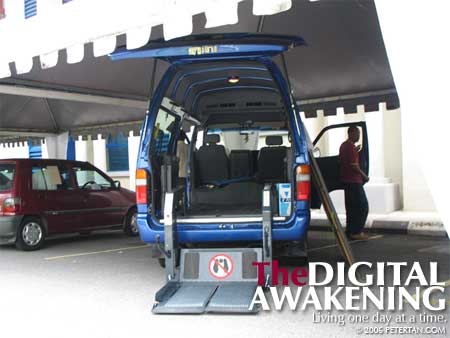Conference on Transportation and Education for Disabled Persons

The BAKTI-MIND Project organised a conference on education and transport at Bangunan Siti Hasmah from December 17 to 20, 2006. The theme of the BAKTI-MIND 2nd Annual Conference is “Empowering Persons with Disabilities (PWD) through Information Provision” which aimed at “Bridging the Critical Gaps in Transportation and Education for PWD in Malaysia.”
The current hot issue is accessible public transportation. This is the line that connects all the dots for disabled persons living in the community. Public transport is crucial to the lives of disabled persons. It allows them to go to school to get an education. It allows them to get to work and be gainful employed. It allows them to lead an active social life. It allows them to fulfil their cultural, political and religious aspirations. In short, being able to move around freely is, among others, the key to a gratifying life for disabled persons.
The three foreign speakers on transport spoke at length about alternative transportation for disabled persons. This mode of transportation is mainly door-to-door or point-to-point service using modified taxis or vans with lifts to ferry specifically wheelchair users, generally people with mobility impairments and other forms of disability. At the same time, Malaysian speakers shared about the state of public and alternative transportation in the country in relation to disabled persons, and also the infrastructure needed to make the entire system effective and practical.
Persatuan Mobiliti Selangor dan Kuala Lumpur is one of the only two groups providing door-to-door transport service for disabled persons in Malaysia currently. At RM3 per trip to anywhere within the Klang Valley, one can see that this service is heavily subsidised. Undeniably, they are doing an impressively good job in providing the transportation needs of disabled persons. Nevertheless their service is limited from nine to five on weekdays only. What happens to those who need transport after-hours and on weekends?
Public transport for the mobility-impaired such as buses and urban rails should be the main mode of transportation because of their vast network and resources. Alternative transport such as accessible taxis and lift vans can play a supplementary role by working on routes not served by public transport and for specific needs that cannot be fulfilled by public buses and trains.
The burden to provide accessible transport to disabled persons should not be left solely on the shoulders of Non-Governmental Organisations and a few private entities. Instead, the government should be proactive in drawing up a sustainable public transportation policy to ensure that no one community is marginalised or inadvertently left out.
